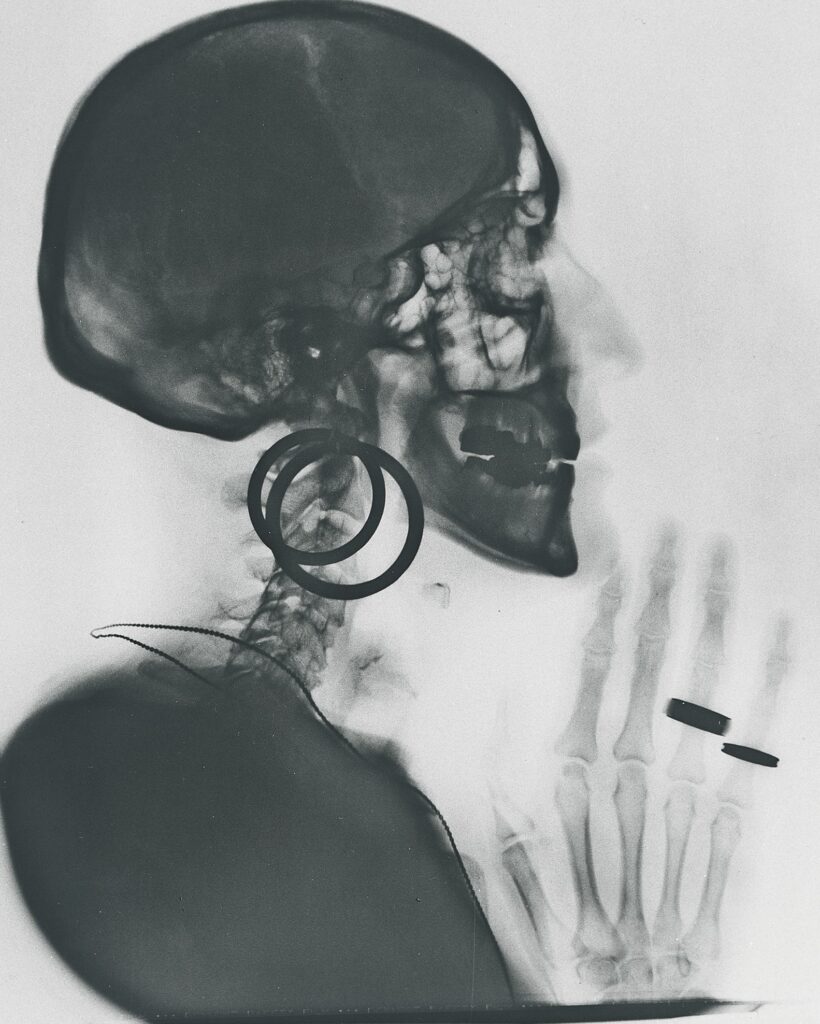
Meret Oppenheim, X-Ray of M.O.’s Skull (Röntgenaufnahme des Schädels M.O.), 1964, printed 1981. Hermann and Margrit Rupf Foundation. Kunstmuseum Bern. Courtesy of the Museum of Modern Art.
Born in 1913 in Berlin’s Charlottenburg district to a German Jewish father and a Swiss mother, Meret Oppenheim lived out the initial decades of her life in the shadows of Europe’s two world wars. Yet hope is inherent in her artistic practice, which spans painting, sculpture, works on paper, jewelry design, and poetry. Oppenheim’s work isn’t particularly uplifting, much less cheery; indeed, the language in her poems is often exceedingly dark and piercing. But her inventive verse opens up spaces for transformation—even under circumstances in which any sense of possibility is veiled by cruelty, and is therefore fleeting. Such contradictions come to life, for example, in an untitled poem that opens with the exclamation “Freedom!”:
Freedom!
Finally!
The harpoons fly
A rainbow encamps on the streets
Undermined only by the distant buzz of giant bees.
Oppenheim began writing poems not long after moving to Paris in 1932 at the age of eighteen; she lived there for several years and visited frequently after she left. All but a handful of her poems are untitled. The bulk of her poetic output took place from 1933 to 1944, though she also wrote several poems later in life—including “Self-Portrait from 50,000 B.C. to X,” her last recorded work, written in 1980, five years before her death. Her poems are in conversation with the French symbolists, who were, of course, lodestars for Breton and the surrealists. Think of the fairies that appear in Oppenheim’s poems, “flying by with bright thighs,” along with the fur, the clover, and the shadows in the woods: all of it recalls the imagery in Rimbaud’s Illuminations. The first exhibition of Oppenheim’s work was at the 1933 Salon des Surindépendants alongside established surrealist artists, but in later decades she chose to distance herself from that limiting label. A retrospective of her work, “Meret Oppenheim: My Exhibition,” opened last weekend at the Museum of Modern Art in New York and will be on view there until March 4, 2023.
—Kathleen Heil
In the beginning is the end
the volcano showered us with gifts
how sad we were
the sky drips on the plates
the grass sinks down covered in dew
hallelujah antics without end
fools blowing flutes
the water lilies lie tentatively beating
their eyes open and closed
the traps are empty
the black sack is full
as seeds to the apple are ants to the earth
no sound is audible only the crescent moon hangs in the sky
fireworks pop and the night is sequinstrewn.
Translated from the German by Kathleen Heil. Heil’s translation of Oppenheim’s collected poems, The Loveliest Vowel Empties, will be published by World Poetry Books in 2023.
from The Paris Review https://ift.tt/MC3xXGc
Comments
Post a Comment